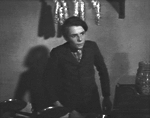From the casual and personably familiar (and inferentially self-confident) running commentary of the film’s introductory behind-the-scenes footage of the cast and crew, Sacha Guitry sets the infectiously picaresque and disarming tone of The Story of a Cheat. An interstitial silhouette of Guitry’s profile provides the clever transition from real-life auteur to fictional character as the bespectacled, middle-aged, self-confessed “Cheat” pens his memoirs at an outdoor table of a bistro that overlooks his former residence – a Parisian townhouse that he would later admit he had won and subsequently lost through the fickle fortune of the cards. Proceeding in flashback as he recounts his youth in the provincial town of Pingolas, the Cheat reveals the unforeseeable and paradoxical set of circumstances that had spared him from accidental death – and unintentionally extolled the virtues of vice – after having earlier stolen change from the cash register in his parents’ grocery store and was consequently forbidden by his father to be served freshly picked mushrooms during dinner as punishment, a side dish that inadvertently turned out to have proved lethal for the rest of the family. Orphaned at the age of twelve and divested of his inheritance by calculating, antipathetic relatives who are only too eager to be rid of him, the young Cheat (Serge Grave) soon sets out to find his own fortune, working his way up from as a bellboy to doorman to elevator operator for a series of luxury hotels throughout France before settling in Monaco after the war, striving to lead an honest life by working in the casinos of Monte Carlo as a croupier until a seemingly fated encounter with an enigmatic woman with soulful eyes named Henriette (Jacqueline Delubac) invariably tempts him to return to his old, incorrigible ways. Composed entirely without dialogue and instead, propelled through anecdotal, first-person narration, the film is a droll, infectiously effervescent, and charming satire on greed, opportunism, chance, and destiny. Guitry’s briskly paced, reflexive tone is further reflected in the recursive nature of the film, most notably in the Cheat’s repeated encounters with his former lovers and also his military comrade Serge (Roger Duchesne), creating a deceptively lyrical, yet insightful and observant commentary on the irrepressibility of human nature.
© Acquarello 2005. All rights reserved.
